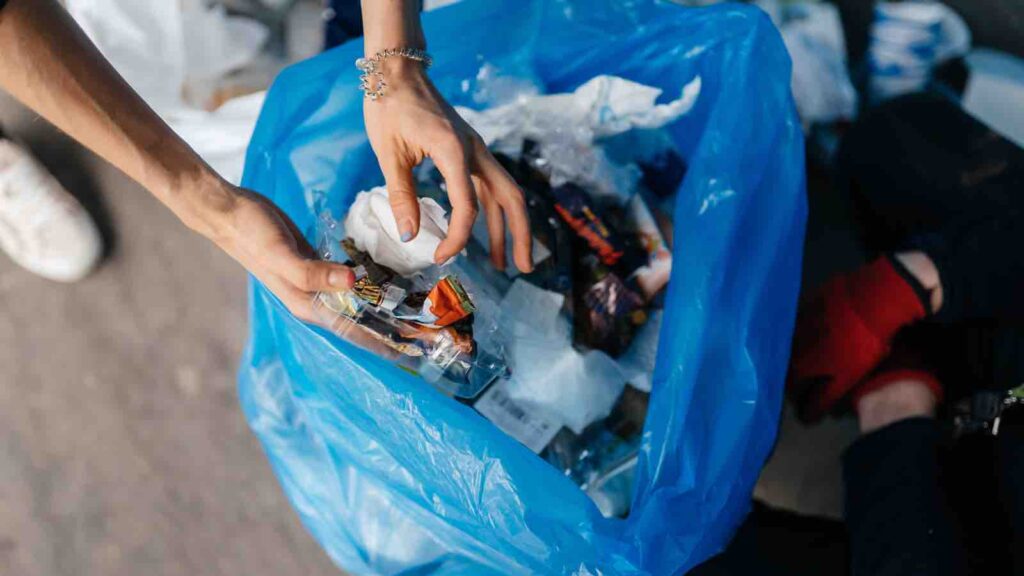The drop in the recycling rate can be attributed to a significant decrease in construction and demolition waste, which is almost entirely recycled, as fewer demolition projects took place in 2023 compared to the previous year.
SINGAPORE — The city-state’s overall recycling rate has declined from 62 percent to 52 percent over the past decade, according to the latest statistics on waste and recycling released by the National Environment Agency (NEA) on Wednesday.
RELEVANT SUSTAINABLE GOALS



The drop in the recycling rate can be attributed to a significant decrease in construction and demolition waste, which is almost entirely recycled, as fewer demolition projects took place in 2023 compared to the previous year.
In 2023, approximately 6.86 million tonnes of solid waste were generated, of which 3.55 million tonnes were recycled, amounting to an overall recycling rate of 52 percent, down from 57 percent in 2022.
2023 Overall Waste and Recycling Statistics
Note:
Figures are rounded to the nearest thousand tonnes and percentage point. Without Construction & Demolition waste, the overall recycling rate was 45% in 2023.
1The recycling rate for the “Others” category is not meaningful as it is an aggregation of miscellaneous waste types that are managed and recycled differently.
Metal recovered from incineration bottom ash for recycling is excluded from waste disposed of.
Wood and horticultural wastes recycled include 447,000 tonnes sent to facilities (e.g. biomass power plants and Sembcorp Energy from Waste plant) for use as fuel.
Please refer to the document waste-and-recycling-statistics-2018-to-2022 for the waste and recycling statistics from 2018 to 2022.
Please refer to this website Statistics on the Environment for more statistics, reports and publications (e.g. Key Environmental Statistics).
A Decade Of Progress In Waste Reduction
Under Singapore’s Zero Waste Masterplan, the country aims to increase its overall recycling rate to 70 percent by 2030. However, the NEA noted that sharp year-on-year changes in the amount of waste generated could result in “huge fluctuations” in overall recycling rates.
The decline was particularly pronounced in paper recycling, which dropped from more than 50 percent in 2013 to 31 percent in 2023. The NEA attributed this decrease to structural factors such as freight costs and commodity prices.
2013 to 2023 Overall Waste and Recycling Statistics
(with and without Construction and Demolition waste)
Despite the dip in the overall recycling rate, there were positive signs of waste reduction efforts. The domestic waste generated per capita, collected from households and trade premises such as schools and hawker centres, decreased by more than 15 percent over the last decade. In 2023, the daily domestic waste generated per capita was 0.88kg, down from 1.08kg in 2013.
Non-domestic waste per dollar Gross Domestic Product generated at industrial and commercial premises also fell from 40 tonnes in 2013 to 26 tonnes last year, a more than 30 percent drop. The NEA stated that the decrease in waste generated indicates that households and companies have taken “positive steps” to reduce and reuse.
During a speech at the joint opening of the Singapore International Water Week and CleanEnviro Summit on Wednesday, Minister for Sustainability and the Environment Grace Fu highlighted the government’s efforts to explore new technologies that could generate higher-value products from mixed solid waste while reducing carbon emissions.
The NEA will assess industry interests and the commercial viability of these technologies, and where suitable, pilot trials may be conducted to evaluate the potential for expansion to full-size disposal facilities.
Acknowledging the “greater urgency” to build a sustainability culture, the NEA emphasized the importance of reducing, reusing, and recycling, stating, “By reducing waste and recycling right, we can do our part to combat climate change and ensure that Singapore remains clean, green, and liveable.”
Lead image courtesy of Hrecheniuk Oleksii (Trash Segregation for Recycling)
You may also be interested in :
Thailand Ramps Up Recycling Efforts For UHT Cartons With Nationwide Initiative



